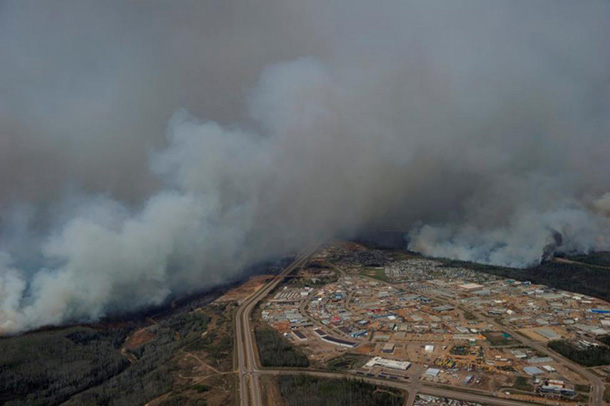At the end of the day the $10-billion wildfire that consumed 2400 homes and buildings in Fort McMurray may be the least of the region's problems.
Although the chaotic evacuation of 80,000 people through walls of flame will likely haunt its brave participants for years, a slow global economic burn has already taken a nasty toll on the region's workers.
That fire began last year when global oil prices crashed by 40 percent and evaporated billions of investment capital in the tarsands.
As the project's most hight cost producers started to bleed cash, corporations laid off 40,000 engineers, labourers, cleaners, welders, mechanics and trades people with little fanfare and even less thanks.
Many of these human "stranded assets" endured home foreclosures and lineups at the food bank.
Worker flights to Red Deer and Kelowna got cancelled and traffic at the city's new airport declined by 16 per cent. Unemployment in Canada's so-called economic engine soared to nearly nine percent.
Despite the high cost of the oil price crash, most residents of Fort McMurray, along with Canada's politicians, think that oil prices will rebound and things will turn around sooner or later. They've seen it all before, they say.
But a number of economic trends and analyses suggest that bitumen's glory days may be over.
Oil demand is slowing
What resembles a string of bad luck may actually be the unfortunate consequence of rapidly developing a high risk and volatile resource with no real safety net.
The first undeniable factor is weakening demand for oil, the engine of global economic growth. China's economy, the world's largest oil importer, is faltering as its industrial revolution peaks and fades.
Europe, Japan and the United States are also using less oil, and their economies are stagnating too.
The global economy has become so stuck in neutral that famous financial power brokers such as Larry Summers now write depressing articles entitled "The Age of Secular Stagnation," in Foreign Affairs no less.
In such a world, little if any bitumen will be needed in the international market place. In fact economists now trace about 50 per cent of the oil price collapse to evaporating demand.
Investors fear getting burned
But there are many other potent signs and they have already covered the economic landscape with smoke.
Murray Edwards, the billionaire tycoon behind Canadian Natural Resources, one of the largest bitumen extractors, has decamped from Alberta to London, England.
Edwards and company slashed $2.4-billion from CNRL's budget in 2015.
Since the oil price crash, by some accounts, Murray's company has lost 50 per cent of its market value.
(Cenovus, another oilsands player, got cursed with junk bond status.)
Edwards likely has read the tea leaves and understands that bitumen might not play a significant role in the secular age of stagnation.
In fact bitumen has lost so much of its global investment lustre that, even before the Fort Mac blaze, Bloomberg reported that no new supplies of low-grade bitumen will enter the market in 2018.
This would mark the first time in more than a decade that the rate of bitumen extraction, now at 2.4 million barrels a day, will not increase.
In addition Carbon Tracker, a market friendly group, now informs investors that low oil prices will favor existing production from low carbon and low cost conventional sources.
That's a terrible forecast for Alberta's oilsands and its product which is neither low cost to produce nor low carbon to refine.
Sold cheap, pricey to refine
Unfortunately, there's more reason to expect Fort McMurray's and the oil patch to get burnt by global economic realities.
Consider the Alberta government data on the dive bombing value it places on bitumen.
The junk low-grade heavy oil or what the Koch brothers accurately call "garbage" (the right-wing billionaires remain the largest buyers of raw bitumen at their Pine Bend facility in Minnesota) is such a complicated and low-grade resource that it requires a complex methodology to grade its market value.
Bitumen might be the world's most expensive hydrocarbon to extract out of the ground, but it remains the world's cheapest refinery feedstock. Due to its low quality it has always sold at a discount to West Texas Intermediate.
About half of all oilsands exports -- 1.2 million barrels -- are raw unrefined bitumen. Unlike the Alberta government, which has rarely thought about adding value to bitumen, the Koch brothers saw an opportunity years ago.
Since the 1980s Koch Industries has been buying Canada's bitumen crude and turning it into high value jet fuel and gasoline at their Pine Bend refinery. In fact Koch Industries now gobbles up 300,000 barrels of bitumen a day and remains the single largest buyer of Canada's dirtiest crude. To the Kochs it's a no brainer: bitumen offers some of the most attractive refinery margins in the world.

With the oil price collapse the Kochs keep on making more money, while Alberta gets poorer.
In February the Alberta government set a minimum value for bitumen at $10 per cubic metre. That equates to a value of about $1.50 per barrel of bitumen.
But in 2014 the government's monthly report valued bitumen at $421 per cubic metre. The data suggests that bitumen has lost 97 per cent of its value during the price collapse. In other words companies once worth billions are now worth millions.
Could that be why Edwards sailed to England?
A slow fire has victims, too
Last but not least comes a pithy analysis by Jeff Rubin, CIBC's former chief economist. Rubin warns that contraction is the only future for the oilsands unless Canada wishes its economy to become "obsolete and non-competitive."
He correctly notes that 80 per cent of the increase in new global oil did not come from OPEC but from high cost bitumen mines and fracked U.S. shale deposits.
North American corporations, in other words, engineered the global oil glut.
Encouraged by easy credit, Big Oil flooded the market with difficult and largely uneconomic hydrocarbons.
The Saudis, the world's number one and cheapest producers, refused to scale back production or give up market share. Instead they precipitated a price free-fall.
When oil prices stood at $100, rash bitumen development made some sense. But when prices fell below $45 the gamble turned into Russian roulette.
Unlike Saudi oil, most bitumen projects require prices of at least $60 to $70 a barrel to survive.
And so most tarsands extractors (except those who own refineries) are now bleeding cash; many banks have developed nervous twitches; and thousands of workers have found themselves unemployed.
The overproduction of bitumen explains why, says Rubin, "the oilsands morphed from an engine of economic growth into the epicenter of a made-in-Canada recession."
Canadian politicians and the media, adds Rubin, still treat the market downturn as "a largely self-correcting" oil price cycle and assume that happy days will return again.
But Rubin doubts that. As the world economy stagnates and begins to cut carbon emissions, demand for oil and its most carbon intensive products from the tarsands, Canada's single largest source of carbon pollution, will likely shrink.
The wise course of action for Alberta and Canada, therefore, rather than being caught by surprise, would be to plan for an orderly transition that protects communities and oilsands workers, and rewards them for the economic contributions they've made by providing funds for retraining and industry diversification.
As Rubin argues, the tarsands can downsize today and avoid more economic pain. Or it could ignore all the smoke and global trends and wait for "massive write downs tomorrow."
No one who has survived a horrific fire wants to hear that sort of truth. But there are nasty and dirty fires burning in the economic woods and they are now stalking a project that industry and government carelessly allowed to grow too fast and too big.
Most Albertans and most Fort McMurray residents never wanted reckless growth. In a heartbeat they would have voted to slow down the tarsands years ago with higher royalties and better regulations, but their political masters refused to put on the brakes.
Ironically enough, only a wildfire has been able to do that. ![]()
Read more: Energy

















Tyee Commenting Guidelines
Comments that violate guidelines risk being deleted, and violations may result in a temporary or permanent user ban. Maintain the spirit of good conversation to stay in the discussion.
*Please note The Tyee is not a forum for spreading misinformation about COVID-19, denying its existence or minimizing its risk to public health.
Do:
Do not: